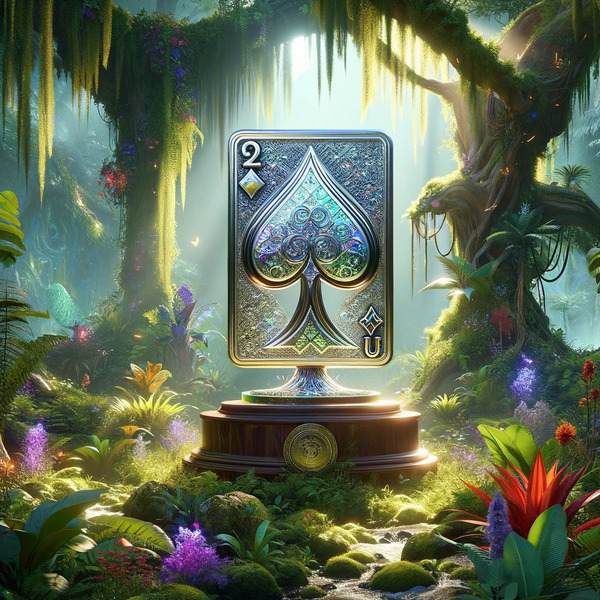How to Play Solitaire: Set Up, Rules, and Strategies
By Neal Taparia - 06/27/2022

Solitaire, also known as Patience and Klondike, is a one-player card game that requires you to arrange cards into four foundation piles in ascending order from ace to king and separated by suit. Although “Solitaire” typically refers to the classic, Klondike Solitaire game, you can play many versions at varying difficulty levels, including Spider Solitaire to FreeCell.
Solitaire Objective
You want to arrange all of the cards into four foundation piles, one for each suit, ascending from Ace to King. You can stack cards on opposite colors in descending order to help arrange the tableau and flip over face-down cards.

Solitaire Setup
Solitaire has four basic piles or sets of piles that you use to play the game—foundation piles, the tableau, stockpile, and waste pile. Before you start playing you need to set up the game properly. The following list explains how to set up the game and how the various piles are used:
- Make room for the foundation piles. The goal is to place all the cards into four foundation piles, separated by suit and arranged in ascending order from ace to king. Since you won’t have foundation piles when you begin the game or begin dealing, leave space in the upper right corner of your game space for these four piles.
- Deal the tableau. The main area of gameplay, the tableau consists of 28 cards laid out in seven columns. After you shuffle, deal one card from left to right to begin seven columns. Continue dealing from left to right so that the first column has one card, and the subsequent columns have an additional card until the last column has seven. The last card of each column should be face-up while the rest of the cards remain facedown until revealed.
- Gather the stockpile. Take the remaining cards and place them facedown—these now become the stockpile. When you run out of moves on the tableau, you can turn over cards from the stockpile to make these cards available to play. Once you turn them face-up, they become part of the waste pile, and you can play the top card on foundation piles or in the tableau. Typically, you place this pile above the first card of the tableau, but some people like to hold it or place it below the tableau.
- Save space for the waste pile. When you flip any cards over from the stockpile, they are placed face-up into the waste pile. You can play the top face-up card, using it to build foundation piles or to arrange cards in the tableau. If you do use the top card, you’re able to play the next face-up card that appears in the waste pile.
How to Play Solitaire
Once you have the game set up, you’re ready to get started. These steps explain how best to play the game.
1. Remember to Move Only Face-Up Cards
The only cards that are playable in Solitaire are face-up cards, and you can access them in the tableau and the waste pile. So as you play, work to uncover as many facedown cards in the tableau as possible. As long as cards are removed from a facedown card, you can turn it face-up, making it accessible to play. When you turn over a card from the stockpile, it becomes a playable face-up card in the waste pile.
2. Turn Over One Card from the Stockpile
You can only move face-up cards, so if you turn over one card from the stockpile, it becomes a playable card in your waste pile. Turning this over before you begin playing gives you an additional card to play and increases your chances of progressing before having to use the stockpile again.
If you play Solitaire Turn 3, however, you must turn three cards over when using the stockpile. When you do this, the third card turned is the top face-up card of the waste pile and is the only one you can use to play. Of course, if you can play it, you can use the card that is underneath!

3. Assess the Tableau
Before you make any moves, look at the tableau and check out what moves make the best sense. Since you want to uncover facedown cards and make them playable, scan the larger columns for possible plays, and see if any of the shorter columns have a good chance of being emptied.
4. Move Aces and Twos to the Foundation Piles
You won’t need aces and twos to move cards in your tableau, so if any are immediately available begin building your foundation piles. You can’t play any more cards into foundation piles until an ace starts one for each suit.

5. Arrange Cards in the Tableau by Color and Rank
To move a card from one column in the tableau to another, you must place it on a card that is the alternate color and one rank higher. So a jack of clubs can be placed on top of a queen of diamonds or hearts, and a seven of spades can be placed on an eight of hearts. You can also move an entire column of cards by following the same rule. The highest ranking card in the column must be placed on a card that is an alternate color and one rank higher.
6. Build on Your Foundation Piles
As you make cards available to play, always check to see whether you can place more cards in your foundation piles. Foundation piles must begin with aces and then ascend to king, and there is one pile for each suit.

7. Use the Waste Pile and Stockpile
As you arrange cards on the tableau, use the top card of the waste pile. If that card doesn’t help, then turn over another card from the stockpile. If you cycle through the entire stockpile, you can refresh it by turning over the waste pile and making it the stockpile again.
Although you can go through the stockpile as many times as you like, if you are unable to play on the tableau and go through the entire stockpile with no new plays, the game is over.

8. Put Kings into Empty Columns
Only kings can be placed in empty columns. So when you empty an entire column move a king or a column of cards with a king into the empty columns.

Strategies to Win Solitaire
Our data reveals that you have a 33% win rate for Turn 1 Solitaire, so help your odds of winning by using the Solitaire strategies in the following sections.
1. Prioritize Facedown Cards
The more cards you turn face-up, the more options you have to play. So focus on revealing facedown cards by moving cards off of them so you can turn them face-up.
2. Focus on Larger Tableau Columns
Larger tableau columns have more facedown cards, and revealing those cards may give you just what you need to make a move. So prioritize moving cards from larger tableau columns to get more face-up cards available to play.
3. Remember the Cards in the Stockpile
Stockpile cards are facedown, but you reveal them as you cycle them into the waste pile. Remember what cards are in the stockpile so you can flip through the pile to get a card you need to make a crucial move.
4. Work the Tableau Before Foundation Piles
You may need cards in the tableau to help make moves so that you can reveal facedown cards. Although an ace or two isn’t necessary in the tableau, other ranks of cards may help you build on a sequence. So if you have a card that can be played both in the tableau as well as a foundation pile, keep it in the tableau until you’re sure you don’t need it anymore.
5. Play from the Foundation Piles
If you discover that the top card on a foundation pile can help you make a play, replay the foundation card so that you open more options for play.
6. Remove All the Cards from Columns
Emptying columns makes room to add kings. Placing kings in empty spaces gives you a safe place to build a sequence and remove cards from other columns. Even if no king is showing yet, focus on emptying entire columns of cards.
7. Use the Hint and Undo Buttons
You can use our hint or undo button to help you play. Use the hint to identify cards that can be moved or use the undo button to backup what you’ve moved so you can make new moves.
Solitaire Variations
If you enjoy playing Solitaire, trying different variations featured in the following sections can give you a different layout, different rules, and a different challenge.
Klondike Turn 1 and Turn 3
Klondike Solitaire has two versions. With Turn 1, you flip over just one card at a time from the stockpile, which is easier. WIth Turn 3, you flip a group of three cards over and can only play the top face-up card, adding to the level of difficulty.
FreeCell
This winnable version uses a standard deck, and like Solitaire, you try to place all of the cards into four foundation piles to win. While FreeCell Solitaire follows many of the rules of Solitaire, it has a different layout. Eight columns are dealt face-up with seven cards in the four columns and six cards in the last four columns. Since all the cards are dealt, you have no stockpile or waste pile.
You arrange cards in the same way by alternating color and descending in rank, and you try to build on your foundation piles. But any card, not just a king can move to a free space, and you also have four open cells next to the foundation piles where you can place any card as you arrange your tableau.
Pyramid Solitaire
Although the layout and rules are deceptively simple, Pyramid Solitaire is a bit more difficult, and the goal is to remove all the cards by pairing up ones that add to 13, regardless of suit. Using a standard deck, the cards are dealt face-up in a pyramid shape, beginning with one at the top and ending with seven at the base. The remaining cards are your stockpile.
Each row of cards in the pyramid overlap the previous row. So you can’t remove cards unless they are available, meaning no cards are overlapping them. You can turn over three cards from the stockpile and use the top face-up card as well as any available cards from the pyramid to make pairs that add to 13.
Spider Solitaire
With a few twists on the classic game, Spider Solitaire is played with two decks of cards, and you must arrange the tableau so that you can place all of the cards into columns, descending from king to ace into eight foundation piles.
The tableau consists of 10 columns with six cards in the first four columns and five cards in the last six columns. Only the top card is face-up. The remaining cards are in the stockpile. You arrange single cards or sequences of cards in descending order until you have an entire column from king to ace. Once you have a complete column, it gets transferred to the foundation pile.
Any cards can go into an empty space, and you must have all empty spaces occupied to use the stockpile. When you use the stockpile, it deals one face-up card onto each column, so you only get one pass through the stockpile. Beginners should play with one suit, but you can increase the challenge by playing with two or four suits.
Golf Solitaire
Like Pyramid Solitaire, Golf Solitaire is a pairing game, and you win by matching cards that are one rank higher or lower than the waste pile card until you clear the tableau. Using one deck of cards, the tableau is dealt as seven columns with five face-up cards in each column. You begin with one card face-up in the waste pile, and the rest are facedown in the stockpile.
You match cards by placing one from the tableau into the waste pile that is one rank higher or lower than the current waste pile card. If the card is a three, then you can play a two or a four, and that becomes the new waste pile card you pair with. You continue placing cards into the waste pile that are one rank higher or lower until you are stuck. Then you can pull one card from the stockpile to be the new face-up waste pile card. You only get one pass through the stockpile.
TriPeaks
Another pairing version, TriPeaks Solitaire requires you to clear the tableau by matching cards that are one rank higher or lower than waste pile cards, similar but more difficult than Golf. One deck of cards is used to deal a tableau that looks like three pyramids. Each pyramid has six facedown cards and the last row of cards consists of 10 face-up cards that connect the pyramids. The remaining cards are your stockpile, and you only get one pass through the stockpile.
Begin by turning up a card from the stockpile into the waste pile. If the card is a nine, you can play an eight or a ten, and that card becomes the new waste pile card. You continue playing a card either one rank above or below each new waste pile card until you are stuck. Then turn over a new waste pile card from the stockpile. As you remove face-up cards, facedown cards in the tableau will become available for play.
Forty Thieves
A difficult version to play, Forty Thieves uses two decks of cards, and you must complete all eight foundation piles according to suit by moving cards one at a time, ascending from ace to king. Cards are dealt into 10 columns with four face-up cards in each column. The remainder of cards becomes your stockpile, and you only get one pass through the stockpile.
You can only move the last card in each column, not an entire sequence of cards, and you must move the card to another card of the same suit but one rank higher. For example, a two of clubs can only be placed on a three of clubs. Any card can be moved into an empty space, and if you have no more plays in the tableau, then you can turn over a card from the stockpile into the waste pile. Only the top card of the waste pile can be used.
Get Started Playing with Solitaired
No matter what version you want to play, Solitaired has the right Solitaire game for you. Whether you want to match and pair cards or sequence them into foundation piles, you’re sure to find a variation that challenges your skills and offers different levels of play to keep your brain ignited and your spirits lifted as you compete against yourself.
About the author

 We’d really love your support! - Get an an ad-free experience
We’d really love your support! - Get an an ad-free experience
